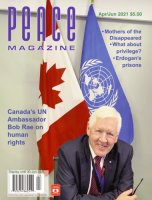
Peace Magazine April-June 2021, page 5. Some rights reserved.
In the January issue of Peace, Alon Ben-Meir wrote: “Before embarking on new negotiations, the Biden administration should insist that both sides unequivocally commit to a two-state solution.”
That solution would of course, preserve Jewish supremacy in Israel, recently enshrined by Israel’s “Nation State Law”. Fully 20 percent of Israel’s population is Palestinian, living as lesser citizens. Ben-Meir also names Israel’s dilemma: A one-state solution which includes the West Bank and Gaza would “undercut its democratic nature.” Translated, that means one state would confirm to the world that Israel is an apartheid regime, where fully one-half of its population, the Palestinians, live under its cruel thumb.
Once people realize Israel’s compIete control over all aspects of life in the occupied Palestinian territories (and the role of the Palestinian Authority as its enforcer), it becomes clear that the occupied Palestinian territories have long been de facto annexed. They are not actually a separate regime from Israel, somehow a temporary occupation “over there,” somehow not part of Israel’s “democracy.” Maps of Israel show no demarcation between Israel and the occupied territories. The territories are referred to as Judea and Samaria by Israelis. Nearly 700,000 Jewish settlers now live in the occupied territories and Palestinian East Jerusalem; they’re not leaving any time soon.
There is no place left for Palestinians to have a state. Israel has worked hard to lay down “facts on the ground” to establish its grip on the whole of the land.
Nonetheless, there is now a shift in the discourse. Many Jewish intellectuals have taken the blinders off and are expressing their Judaism by working for equality and freedom for all.
Sally Campbell
Hornby Island, BC
The Covid-19 pandemic has impacted everyone’s life, and at the same time has exacerbated structural inequalities in vulnerable groups that had been crying out for help even beforehand: notably refugees and internally displaced persons.
According to UNHCR, 79.5 million people worldwide have been forced to flee their homes. Many of them remain in overcrowded refugee camps, such as Greece’s largest camp Moria on the island of Lesbos where 7,000 refugees live—or rather survive—without minimum standards of water supply, sanitation and hygiene. Everybody there is awaiting the outcome of their asylum claims without result, with hunger, uncertainty and now the pandemic weighing on them.
In this place children cut their own bodies and openly say they want to die. In February, a refugee woman, eight months pregnant, set herself on fire after being told that her relocation to Germany was being postponed. Instead of receiving attention for the mental impacts she had experienced, this 26-year-old woman is charged with aggravated arson and destruction of public property! On the one hand, people claim to seek solutions for the refugee’s plight, while on the other hand, they punish them.
Despite the efforts of international organizations such as UNHCR to assist refugees and internally displaced persons, the challenges exceed their capacity. What is required is a more equitable sharing by countries of the burden and responsibility for facing this crisis.
Elida Guerra Vilcapoma
Lima, Peru
What I admire most about some non-Western cultures is that they don’t put their aged family members in seniors care homes. They are not left vulnerable by cost-cutting measures that some care-home owners use to maximize profit. Many Canadian care homes were neglected before Covid-19 but we didn’t fully comprehend it until the pandemic hit, as we horrifically discovered about ten months ago at the CHSLD Résidence Herron in Dorval, Quebec.
Western business culture, and by extension society, allowed the wellbeing of our oldest family members to be determined by corporate profit-margins. Our governments mostly did not intervene, perhaps because they feared being labeled as anti-business. The buck morally and ethically has to stop with the health and lives of human beings, especially those who have little or no voice.
Frank Sterle Jr.
White Rock, BC